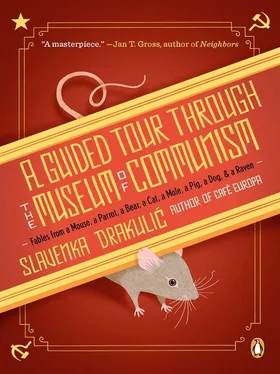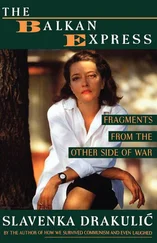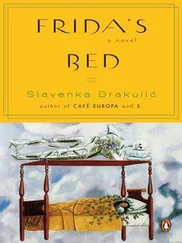Koki could tell you more about the Marshal because he knew him well. For many years they used to spend hours and hours together over the summer, talking or just contemplating in silence the beauty of the place. And Koki could tell him everything; Koki was a fearless little birdie. After all, why should such a big, historical persona be afraid of Koki’s words? Of anybody’s words, for that matter? Later Koki understood that being a bird was to his advantage. Had he been a man, his words might have landed him in prison! Yes, that had happened, even with his good friends. You don’t agree with him? Off to prison with you! It was that simple.
But though Koki lived in a cage then (and now), and therefore was a kind of prisoner himself, he was free to say whatever he wanted! It is a contradiction to even think about any kind freedom if you are living in a cage, yes. But at least the Marshal would let you think that living in that cage was your own choice . Indeed, he spent his life doing just that, making some twenty million Yugoslavs believe they were free. Well, their cage was more colorful than others of their kind, but it was still a cage. Yet people believed him, as did Koki-birdie, too.
After the advent of democracy, every few years another old bugger comes along and takes up residence here. Mercifully, parrots live much longer than men, which means that Koki knows the presidents who have come to the island since the Marshal’s time, both of them so far. He knows how different they are from the old one—and how power makes them more similar to him than you would believe. To tell you the truth, by the time Koki adjusts to the new, elected president in the Brioni residence (that is the formal difference between the Marshal and these new guys) he is replaced by another. All too soon! It is more comfortable to look at the same face and tell the same jokes for decades, as before, yes? The first to come after the Marshal was his former Communist general-turned-nationalist, an unpleasant, arrogant man with a twisted mouth. Being too lazy to learn new names, this little birdie had high hopes that the man would stay long enough in power for Koki to get used to him. The man himself had even higher hopes! Indeed, Twisted Mouth demonstrated the same intention as the Marshal: to stay in power forever. However, he was far less charming. He suffered from an inferiority complex and went so far as to even order an almost identical uniform as the Marshal’s. It was white, like his, with golden epaulettes and lots of medals—he, too, had decorated himself, of course. But in spite of all his efforts, he looked somehow pompous in it. Twisted Mouth was just an imitator, like Koki the parrot, ha ha! Poor man, he almost managed to get elected president for life, but the problem was that his life did not last as long as he surely had expected.
Once, when Twisted Mouth brought some important guests to see him, Koki pretended to be just a stupid parrot and screamed right into his face: “ Long live Comrade Tito! Long live Yugoslavia!” People here used to shout such slogans on different public occasions. Like during the Marshal’s long speeches, a rally organized for his birthday, a May Day parade, or maybe a visit by some foreign dignitary. I could tell that Twisted Mouth hated Koki for that. He seriously lacked a sense of humor. When Koki shouted like that, Twisted Mouth would go pale in the face and point at Koki, his hand shaking with rage. Ooooh… Koki would get reeeeeally scared. Koki admits that he’s got a loose tongue and tends to make jokes, pretends to be stupid, teases people, even makes them nervous by telling the truth sometimes. That time Koki survived only because he is a popular tourist attraction. One of the exhibits, like the remains of a Roman villa nearby.
Koki did not like Twisted Mouth at all! Maybe because that stuffed bird did not like Koki either? He considered him—Koki!—ridiculous! Perhaps he even considered Koki a traitor? Sometimes Koki thinks these new presidents and their staffs think that just because Koki was the Marshal’s trusted companion. How primitive can one get? But everybody who was associated with him is suspect nowadays—even a simple little birdie. On the other hand, Koki tries to understand their paranoia: One has to be watchful! “The enemy never sleeps”—as people used to say during the Marshal’s times.
Confidentially, Koki did not like the guys who visited Twisted Mouth either. They were dubious men in black leather jackets speaking to him under their breath, looking around as if they were all part of some great conspiracy. And maybe they were? Then there were other, normal-looking guys in gray suits. Koki could tell that they were foxy old commies who had just switched from the Communist to the new, nationalist ideology. All these guys were somber and grim. Of course, Koki heard why they were of such an unpleasant disposition. These were difficult times for the new president, Twisted Mouth, and his new small state of Croatia—there was a war (or even wars) going on on the mainland, in his formerly beloved Yugoslavia. During his short visits to the Brioni residence Twisted Mouth would get very, very nervous and would talk much, showing maps to the brand-new generals in their brand-new uniforms. Very serious business it was, the war, I mean. During the four war years Koki would not see much of this president and his entourage—or of tourists, for that matter. Twisted Mouth obviously did not care for what this island has to offer, the beauty of nature, of fine food and drink, a nice swim, or a game of golf. I am afraid that with him the former glory of Brioni was gone forever. By the way, did you know that this was home to the biggest golf course in Europe at the beginning of the last century? Yes, very fine people used to come here, aristocrats, millionaires—a great tradition!
Interestingly, Twisted Mouth reminded Koki of the Marshal. Not only because he emulated his looks, but because of his death. Shortly before he ended up in a hospital from which he wouldn’t emerge again, he held a press conference. A journalist expressed his concern because the president looked ill, but he rudely replied: “What kind of question is that? Am I not even allowed to have the flu?” However, it was not the flu that killed him but his own disbelief in his mortality. He had an infection but did not take care of it in time. This denial of death is what connects the two of them. The mere idea of it was offensive to both.
• • •
Yes, thinking of glitz and glamour, Koki misses the Marshal. That vigorous, charismatic oldie was interesting and amusing to Koki. But he misses even more the fun of it all—the dinners, guests, strolls, the courting, the gossiping, the beautiful ladies, and the importance this place used to have. However, Koki doesn’t say that openly. The current, third president, the Porcupine (Koki’s nickname!), is not dangerously suspicious about Koki’s “Communist” past. What Koki finds most important about him is that he has a good sense of humor. He would perhaps even understand Koki’s reminiscences about “the good old days,” though, officially, these were “dark times.” According to the new gospel, Yugoslavia was “the prison of the nations,” as I heard Twisted Mouth explain to whoever cared to listen. But still, there are people around this quite likable old Porcupine who would promptly brand even a simple little birdie a “Yugo nostalgic”—which is just another word for traitor. Living in a democracy, one would think that a parrot should be entitled to bestow his political and other sympathies freely, to whomever he so pleases—especially concerning the past. But Koki knows better, so he keeps his feelings to himself in order not to—God forbid!—lose his job. He has witnessed that certain things, or should he say, habits, have not changed that much since the Marshal’s times. Every new man in power, just like the old one, feels endangered. After all, this state is only a baby state, not even twenty years old. Much younger than Koki himself!
Читать дальше












